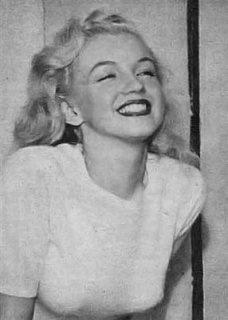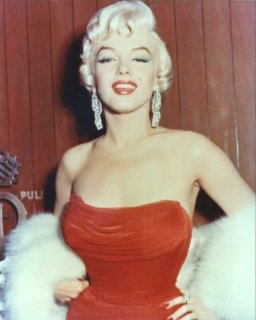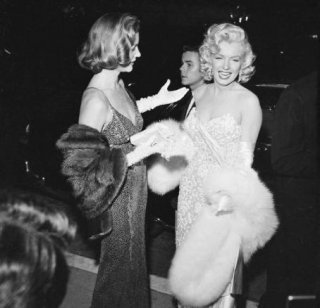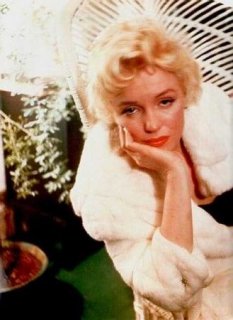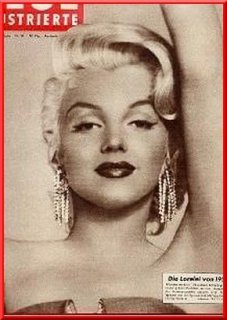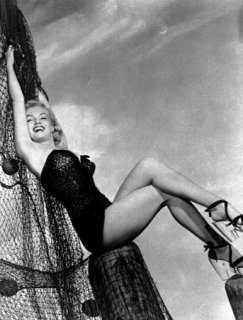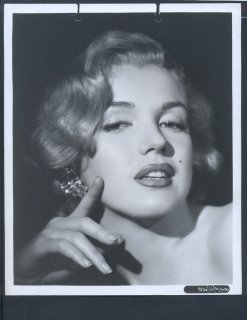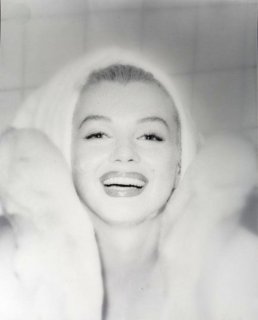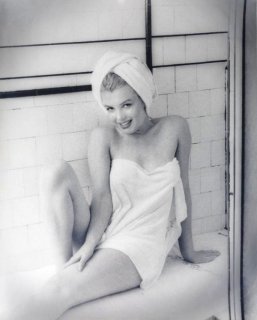-
The F/W 2026.27 Show Schedules...
New York Fashion Week (February 11th - February 16th) London Fashion Week (February 19th - February 23rd) Milan Fashion Week (February 24th - March 2nd) Paris Fashion Week (March 2nd - March 10th)
You are using an out of date browser. It may not display this or other websites correctly.
You should upgrade or use an alternative browser.
You should upgrade or use an alternative browser.
Marilyn Monroe #1
- Thread starter Mercedes
- Start date
- Status
- Not open for further replies.
lady stardust
Active Member
- Joined
- Nov 17, 2004
- Messages
- 11,987
- Reaction score
- 6
lady stardust
Active Member
- Joined
- Nov 17, 2004
- Messages
- 11,987
- Reaction score
- 6
lady stardust
Active Member
- Joined
- Nov 17, 2004
- Messages
- 11,987
- Reaction score
- 6
Platinum Blonde
Active Member
- Joined
- Jan 18, 2006
- Messages
- 2,658
- Reaction score
- 1
I didn't know that. I would love to have a exaxt copy of that sweater.
Heres the sweater...
http://www.starskysweater.com/monroe.htm
& heres the site...
http://www.starskysweater.com/
His name is Ian & his email is at the very bottom of the site page.
If anyone gets one tell him Tiffany sent you.
I dont get anything out of it or anything... its just that hes been so nice & a big help to me. So I just want to do something nice for him. Plus the sweater looks amazing. I cant wait to get one!!
http://www.starskysweater.com/monroe.htm
& heres the site...
http://www.starskysweater.com/
His name is Ian & his email is at the very bottom of the site page.
If anyone gets one tell him Tiffany sent you.

I dont get anything out of it or anything... its just that hes been so nice & a big help to me. So I just want to do something nice for him. Plus the sweater looks amazing. I cant wait to get one!!
Last edited by a moderator:
lady stardust
Active Member
- Joined
- Nov 17, 2004
- Messages
- 11,987
- Reaction score
- 6
lady stardust
Active Member
- Joined
- Nov 17, 2004
- Messages
- 11,987
- Reaction score
- 6
Madness of Marilyn: The affair with JFK and the drug crazed paranoia that put her in
Dailymail.co.uk.
At the end of February 1962 the British actor Peter Lawford and his wife Pat - John F. Kennedy's sister - invited Marilyn Monroe to a dinner party in New York that was being held to honour the President.
'Jack' Kennedy loved Hollywood culture and celebrities, especially beautiful actresses, or, more specifically, beautiful blonde actresses - though he never tossed a brunette or redhead out of his bed either. Marilyn had actually met Kennedy twice before, once when their flirtatiousness was noticed by onlookers, but she did not have a chance to speak to him in depth.
Dinner was at eight, but at 9pm Marilyn was still sitting in front of her dressing-table mirror, putting the finishing touches to her make-up. Notoriously late for everything, she was happy to keep the President of the United States waiting.
She eventually arrived at JFK's hotel, more than an hour late, with Lawford's business partner Milt Ebbins. She drew a deep breath, smoothed down her dress and said: 'OK, shall we?'
'When she walked in, it was like the parting of the Red Sea,' Ebbins recalled. 'There were about 25 people in there and the crowd divided into halves as she walked through the room.'
The actress Arlene Dahl, who was also at that party, said: 'Marilyn walked in and everything stopped, everyone stopped. It was magical, really. I've never seen anyone stop a room like that.
'The President turned around and you could see that he was immediately attracted to her. "Finally! You're here," he said, with a big smile. "There are some people here who are dying to meet you." Then she was descended upon. People just wanted to stand near her, smell her fragrance, breathe the same air.'
Dailymail.co.uk.
At the end of February 1962 the British actor Peter Lawford and his wife Pat - John F. Kennedy's sister - invited Marilyn Monroe to a dinner party in New York that was being held to honour the President.
'Jack' Kennedy loved Hollywood culture and celebrities, especially beautiful actresses, or, more specifically, beautiful blonde actresses - though he never tossed a brunette or redhead out of his bed either. Marilyn had actually met Kennedy twice before, once when their flirtatiousness was noticed by onlookers, but she did not have a chance to speak to him in depth.
Dinner was at eight, but at 9pm Marilyn was still sitting in front of her dressing-table mirror, putting the finishing touches to her make-up. Notoriously late for everything, she was happy to keep the President of the United States waiting.
She eventually arrived at JFK's hotel, more than an hour late, with Lawford's business partner Milt Ebbins. She drew a deep breath, smoothed down her dress and said: 'OK, shall we?'
'When she walked in, it was like the parting of the Red Sea,' Ebbins recalled. 'There were about 25 people in there and the crowd divided into halves as she walked through the room.'
The actress Arlene Dahl, who was also at that party, said: 'Marilyn walked in and everything stopped, everyone stopped. It was magical, really. I've never seen anyone stop a room like that.
'The President turned around and you could see that he was immediately attracted to her. "Finally! You're here," he said, with a big smile. "There are some people here who are dying to meet you." Then she was descended upon. People just wanted to stand near her, smell her fragrance, breathe the same air.'
Dailymail.co.uk.
JFK took Marilyn's arm and off they went to the table - but not before turning to Ebbins and giving him a wry little smile and a wink.
Before she left, JFK asked for her phone number. Of course, she gave it to him. He called her the very next day with a suggestion - he was going to be in Palm Springs on March 24, why not join him there? Oh, and incidentally, he told her: 'Jackie [his long-suffering and much cheated-on wife] won't be there.'
Philip Watson, a former Los Angeles county assessor, met Marilyn while she was with Kennedy at Bing Crosby's Spanish-style house in Palm Springs. He recalls that she seemed calm and relaxed, and was wearing what he described as 'kind of a robe thing' - which was not too out of place, as there were a lot of people by the pool.
'There was no question in my mind that Marilyn and the President were together,' he said. 'They were having a good time. She'd had a lot to drink. It was obvious they were intimate and that they were staying there together for the night.'
The tryst was to have unforeseen tragic consequences. While Marilyn became obsessed with the President, for him the weekend with the world's most desirable woman was simply another notch - albeit an impressive one - on his bedstead.
'Jack was pretty much done with her after Palm Springs,' said Florida Senator George Smathers, a good friend of Kennedy's. 'JFK told me that they were talking and he happened to say something to her like: "You're not really First Lady material, anyway, Marilyn." He said it really stuck in her craw. She didn't like hearing that.
'I think he only saw her one more time, and that was when she came into Washington unexpectedly and we - he, I and a few others - took her sailing on a motorboat down the Potomac River.
JFK took Marilyn's arm and off they went to the table - but not before turning to Ebbins and giving him a wry little smile and a wink.
Before she left, JFK asked for her phone number. Of course, she gave it to him. He called her the very next day with a suggestion - he was going to be in Palm Springs on March 24, why not join him there? Oh, and incidentally, he told her: 'Jackie [his long-suffering and much cheated-on wife] won't be there.'
Philip Watson, a former Los Angeles county assessor, met Marilyn while she was with Kennedy at Bing Crosby's Spanish-style house in Palm Springs. He recalls that she seemed calm and relaxed, and was wearing what he described as 'kind of a robe thing' - which was not too out of place, as there were a lot of people by the pool.
'There was no question in my mind that Marilyn and the President were together,' he said. 'They were having a good time. She'd had a lot to drink. It was obvious they were intimate and that they were staying there together for the night.'
The tryst was to have unforeseen tragic consequences. While Marilyn became obsessed with the President, for him the weekend with the world's most desirable woman was simply another notch - albeit an impressive one - on his bedstead.
'Jack was pretty much done with her after Palm Springs,' said Florida Senator George Smathers, a good friend of Kennedy's. 'JFK told me that they were talking and he happened to say something to her like: "You're not really First Lady material, anyway, Marilyn." He said it really stuck in her craw. She didn't like hearing that.
'I think he only saw her one more time, and that was when she came into Washington unexpectedly and we - he, I and a few others - took her sailing on a motorboat down the Potomac River.
The same source.
'We got back at 11.30 at night. She didn't stay at the White House, she stayed somewhere else. There was no hanky-panky between her and JFK that night. I know, because I asked him the next day and he would have happily said so.
'But, anyway, Jackie knew about that trip. In fact, we were dancing at a White House ball and she said to me: "Don't think I'm naive about what you and Jack are doing with all those pretty girls, like Marilyn, sailing on the Potomac under the moonlight."
'She was accustomed to Kennedy's indiscretions, but this one bothered her. She knew from what she'd heard and read that Marilyn was a troubled woman. It wasn't so much that she was angry about it, more that she was just disgusted.'
Sadly, Jackie was the only person close to the President who had realised - or voiced concern about - Marilyn's vulnerability. Even the briefest glance at her psychological history should have set off alarm bells among Kennedy's aides that this was one woman not to be seduced and discarded like so many other of his conquests.
The scars of Marilyn's past were visible to anyone who chose to look, and her impulsive and drug-fuelled behaviour repeated itself throughout all her relationships
By 1962, the year she died, she was heavily dependent on prescription drugs and alcohol to control her emotional instability. She feared she had inherited her mother's paranoid schizophrenia and often heard 'voices' or claimed she was being followed.
Since childhood, she had been unable to cope with any form of rejection or criticism and, on a number of occasions, took pills in apparent suicide attempts. Insecure, needy and with three failed marriages, she was desperate to find a man to compensate for the lack of a father figure in her disrupted childhood.
Her first marriage, at the age of 16, had been to a neighbour's son, Jim Dougherty, whom she called, bizarrely, Daddy. In the early days of their marriage she told Jim she thought she was being followed, and she began to use threats of suicide to gain attention: 'If anything bad happens to our marriage,' she would warn him, 'I'll jump off a bridge, Daddy.'
The marriage failed when Marilyn's photogenic potential was spotted and she was encouraged to try her luck in the ruthless Hollywood studio system. She was noticed in 1949 by Johnny Hyde, a powerful agent with the William Morris agency. He became obsessed with her; she, in turn, saw him as a powerful father figure who, more importantly, had a way of fixing the voices she heard in her head.
He believed that barbiturates would help, and at his behest studio doctors began prescribing drugs to her on a regular basis. They did help - at least, in the short term. Her anxieties decreased and the voices became softer and bothered her less. It was the start of a lifelong relationship with medication.
But in December 1950 Johnny Hyde died of a heart attack. A couple of days after his funeral, Marilyn's acting coach Natasha Lytess found her collapsed in her bedroom. Horrified, Natasha rushed to her side and forced open her mouth. It was full of dissolving pills.
Her third marriage, in June 1956, was to yet another father figure - the intellectual playwright Arthur Miller, who, at 40, was older than her by a decade. But a miscarriage, followed by a heartless letter from her mentally unstable mother Gladys - telling her that along with motherhood came certain responsibilities, 'and you, dear child, are not a responsible person' - was the catalyst for Marilyn's increasing dependence on drink and drugs.
One night, Miller had a phone call from her while he was in a restaurant; she said he had to come home and save her. She had taken an overdose.
Edward Lovitz, a screenwriter who had known Miller for many years, said: 'Arthur told me that he thought she needed psychiatric help, that she would start to scream at him for no apparent reason. He wasn't sure if it was the drugs she was taking, the alcohol or just her mind breaking down on her.'
The end of her marriage to Miller resulted in the next big crisis in Marilyn's life. Alarmed by her suicidal obsession, her psychiatrist Dr Marianne Kris suggested that she check into a private ward at New York Hospital for some rest under medical supervision. Reluctantly, Marilyn agreed.
On Sunday, February 5, 1961, Dr Kris drove her to the hospital, where Marilyn checked in using the pseudonym of Faye Miller. However, when the time came to go to her room, she found herself being taken to another clinic on the premises.
Her journey involved passing through numerous steel doors, most of which required a key from both sides. Suddenly, it all became clear: those doors were meant to keep people in, not keep people out - she was in the Payne Whitney Clinic, the psychiatric division of the hospital.
After a hysterical tantrum, she was forcibly thrown into a sparse padded room with barred windows. She banged her fists against the hard metal door until two nurses came. If she persisted, they warned her, she would be put into a straitjacket. They turned off the light, leaving their stunned patient in the dark - and without her medication.
She hurled a chair against the glass on the bathroom door, then extracted a small, sharp sliver from the cracked window. As a team of doctors and nurses burst into her room, she held the jagged glass to her wrist. 'If you don't let me out of here, I'll ***********,' she threatened.
Monroe was taken to a floor for seriously disturbed patients, where a young doctor came in to see her. 'Why are you so unhappy?' he asked her. Marilyn answered: 'I've been paying the best doctors a fortune to find out the answer to that question, and you're asking me?'
On Thursday morning, she was allowed to make one phone call. She knew she would have to contact someone who would move heaven and earth to get her out of that place. Who was the most obstinate man she knew? Her former husband, baseball star Joe DiMaggio.
Their marriage hadn't ended well, but based on the kind of man he was, she knew she would be able to count on him.
His friend Stacy Edwards recalled: 'Joe told me he's sitting in his motel room in Florida having a cold beer and watching TV when the phone rings. It's Marilyn, sobbing that she's in a nuthouse in New York and she needs him to get her out of there.
'He thought it was a joke. He said she was making no sense at all and he thought it was a prank, or she was high on pills and delusional. But after he calmed her down, she told him she needed him. That was all he needed to hear. He jumped on the next plane.'
'We got back at 11.30 at night. She didn't stay at the White House, she stayed somewhere else. There was no hanky-panky between her and JFK that night. I know, because I asked him the next day and he would have happily said so.
'But, anyway, Jackie knew about that trip. In fact, we were dancing at a White House ball and she said to me: "Don't think I'm naive about what you and Jack are doing with all those pretty girls, like Marilyn, sailing on the Potomac under the moonlight."
'She was accustomed to Kennedy's indiscretions, but this one bothered her. She knew from what she'd heard and read that Marilyn was a troubled woman. It wasn't so much that she was angry about it, more that she was just disgusted.'
Sadly, Jackie was the only person close to the President who had realised - or voiced concern about - Marilyn's vulnerability. Even the briefest glance at her psychological history should have set off alarm bells among Kennedy's aides that this was one woman not to be seduced and discarded like so many other of his conquests.
The scars of Marilyn's past were visible to anyone who chose to look, and her impulsive and drug-fuelled behaviour repeated itself throughout all her relationships
By 1962, the year she died, she was heavily dependent on prescription drugs and alcohol to control her emotional instability. She feared she had inherited her mother's paranoid schizophrenia and often heard 'voices' or claimed she was being followed.
Since childhood, she had been unable to cope with any form of rejection or criticism and, on a number of occasions, took pills in apparent suicide attempts. Insecure, needy and with three failed marriages, she was desperate to find a man to compensate for the lack of a father figure in her disrupted childhood.
Her first marriage, at the age of 16, had been to a neighbour's son, Jim Dougherty, whom she called, bizarrely, Daddy. In the early days of their marriage she told Jim she thought she was being followed, and she began to use threats of suicide to gain attention: 'If anything bad happens to our marriage,' she would warn him, 'I'll jump off a bridge, Daddy.'
The marriage failed when Marilyn's photogenic potential was spotted and she was encouraged to try her luck in the ruthless Hollywood studio system. She was noticed in 1949 by Johnny Hyde, a powerful agent with the William Morris agency. He became obsessed with her; she, in turn, saw him as a powerful father figure who, more importantly, had a way of fixing the voices she heard in her head.
He believed that barbiturates would help, and at his behest studio doctors began prescribing drugs to her on a regular basis. They did help - at least, in the short term. Her anxieties decreased and the voices became softer and bothered her less. It was the start of a lifelong relationship with medication.
But in December 1950 Johnny Hyde died of a heart attack. A couple of days after his funeral, Marilyn's acting coach Natasha Lytess found her collapsed in her bedroom. Horrified, Natasha rushed to her side and forced open her mouth. It was full of dissolving pills.
Her third marriage, in June 1956, was to yet another father figure - the intellectual playwright Arthur Miller, who, at 40, was older than her by a decade. But a miscarriage, followed by a heartless letter from her mentally unstable mother Gladys - telling her that along with motherhood came certain responsibilities, 'and you, dear child, are not a responsible person' - was the catalyst for Marilyn's increasing dependence on drink and drugs.
One night, Miller had a phone call from her while he was in a restaurant; she said he had to come home and save her. She had taken an overdose.
Edward Lovitz, a screenwriter who had known Miller for many years, said: 'Arthur told me that he thought she needed psychiatric help, that she would start to scream at him for no apparent reason. He wasn't sure if it was the drugs she was taking, the alcohol or just her mind breaking down on her.'
The end of her marriage to Miller resulted in the next big crisis in Marilyn's life. Alarmed by her suicidal obsession, her psychiatrist Dr Marianne Kris suggested that she check into a private ward at New York Hospital for some rest under medical supervision. Reluctantly, Marilyn agreed.
On Sunday, February 5, 1961, Dr Kris drove her to the hospital, where Marilyn checked in using the pseudonym of Faye Miller. However, when the time came to go to her room, she found herself being taken to another clinic on the premises.
Her journey involved passing through numerous steel doors, most of which required a key from both sides. Suddenly, it all became clear: those doors were meant to keep people in, not keep people out - she was in the Payne Whitney Clinic, the psychiatric division of the hospital.
After a hysterical tantrum, she was forcibly thrown into a sparse padded room with barred windows. She banged her fists against the hard metal door until two nurses came. If she persisted, they warned her, she would be put into a straitjacket. They turned off the light, leaving their stunned patient in the dark - and without her medication.
She hurled a chair against the glass on the bathroom door, then extracted a small, sharp sliver from the cracked window. As a team of doctors and nurses burst into her room, she held the jagged glass to her wrist. 'If you don't let me out of here, I'll ***********,' she threatened.
Monroe was taken to a floor for seriously disturbed patients, where a young doctor came in to see her. 'Why are you so unhappy?' he asked her. Marilyn answered: 'I've been paying the best doctors a fortune to find out the answer to that question, and you're asking me?'
On Thursday morning, she was allowed to make one phone call. She knew she would have to contact someone who would move heaven and earth to get her out of that place. Who was the most obstinate man she knew? Her former husband, baseball star Joe DiMaggio.
Their marriage hadn't ended well, but based on the kind of man he was, she knew she would be able to count on him.
His friend Stacy Edwards recalled: 'Joe told me he's sitting in his motel room in Florida having a cold beer and watching TV when the phone rings. It's Marilyn, sobbing that she's in a nuthouse in New York and she needs him to get her out of there.
'He thought it was a joke. He said she was making no sense at all and he thought it was a prank, or she was high on pills and delusional. But after he calmed her down, she told him she needed him. That was all he needed to hear. He jumped on the next plane.'
The same source.
DiMaggio showed up at Payne Whitney that very night and demanded Marilyn be released into his custody the following morning or 'I swear to Christ I'll take this hospital apart brick by brick', he threatened.
Once out of there, DiMaggio convinced Marilyn to go to another hospital and she agreed on condition he came to visit her every day. She stayed there for three weeks and her first action was to contact her attorney, Aaron Frosch. She demanded that he draft a document that would prevent any one person from ever having the power to commit her again without first consulting DiMaggio.
This, then, was the turbulent background against which Marilyn's doomed friendship with the all-powerful Kennedy clan grew. Yet none of them seems to have wondered for a moment whether her instability would rebound on them.
The Kennedy connection was forged in the spring of 1960 while Marilyn was in Los Angeles. She met a woman who would not only go on to become a good friend but would actually alter the course of her life - Patricia Kennedy Lawford.
The sixth of Joe and Rose Kennedy's nine children and sister to JFK and Bobby, Pat's marriage to Peter Lawford was troubled almost from the start because of the actor's drinking habits, his serial infidelity and, later, his obsession with trying to fit in with Frank Sinatra's notorious Rat Pack.
Befriending Marilyn added more glamour to Pat's already high-flying lifestyle - but also gave her someone unique to introduce to her more successful siblings, especially Jack, by then President of the United States.
The dinner party invitation she issued in order for Marilyn to meet Jack led to the Palm Springs weekend. But my research shows that, contrary to decades of speculative reports of an intimate, protracted relationship, what Marilyn really shared with JFK was either one or two nights of probable passion.
As one Secret Service agent stated: 'We all knew about the weekend. It wasn't until she and the President were both dead that people started talking about an affair. Trust me, no one was saying anything about an affair in 1962.
'What we knew was that JFK and Marilyn had sex at Bing Crosby's, and that's it. We didn't think it was a big deal. He had sex with a lot of women. She was just one of many and it wasn't that noteworthy.
'If there was more to it between them, they somehow managed to keep it from us - and I don't think you can keep something like that from the Secret Service.'
The weekend in Palm Springs might have been no more to JFK than a thrilling conquest, but to Marilyn it meant much, much more. Afterwards she thought of little else and was obsessed with seeing him again.
Rupert Allan, Marilyn's publicist, recalled that she seemed 'fixated on the President. It started to become unclear as to what was going on between them, even though I thought it wasn't much. She was acting like she wanted more, though.'
DiMaggio showed up at Payne Whitney that very night and demanded Marilyn be released into his custody the following morning or 'I swear to Christ I'll take this hospital apart brick by brick', he threatened.
Once out of there, DiMaggio convinced Marilyn to go to another hospital and she agreed on condition he came to visit her every day. She stayed there for three weeks and her first action was to contact her attorney, Aaron Frosch. She demanded that he draft a document that would prevent any one person from ever having the power to commit her again without first consulting DiMaggio.
This, then, was the turbulent background against which Marilyn's doomed friendship with the all-powerful Kennedy clan grew. Yet none of them seems to have wondered for a moment whether her instability would rebound on them.
The Kennedy connection was forged in the spring of 1960 while Marilyn was in Los Angeles. She met a woman who would not only go on to become a good friend but would actually alter the course of her life - Patricia Kennedy Lawford.
The sixth of Joe and Rose Kennedy's nine children and sister to JFK and Bobby, Pat's marriage to Peter Lawford was troubled almost from the start because of the actor's drinking habits, his serial infidelity and, later, his obsession with trying to fit in with Frank Sinatra's notorious Rat Pack.
Befriending Marilyn added more glamour to Pat's already high-flying lifestyle - but also gave her someone unique to introduce to her more successful siblings, especially Jack, by then President of the United States.
The dinner party invitation she issued in order for Marilyn to meet Jack led to the Palm Springs weekend. But my research shows that, contrary to decades of speculative reports of an intimate, protracted relationship, what Marilyn really shared with JFK was either one or two nights of probable passion.
As one Secret Service agent stated: 'We all knew about the weekend. It wasn't until she and the President were both dead that people started talking about an affair. Trust me, no one was saying anything about an affair in 1962.
'What we knew was that JFK and Marilyn had sex at Bing Crosby's, and that's it. We didn't think it was a big deal. He had sex with a lot of women. She was just one of many and it wasn't that noteworthy.
'If there was more to it between them, they somehow managed to keep it from us - and I don't think you can keep something like that from the Secret Service.'
The weekend in Palm Springs might have been no more to JFK than a thrilling conquest, but to Marilyn it meant much, much more. Afterwards she thought of little else and was obsessed with seeing him again.
Rupert Allan, Marilyn's publicist, recalled that she seemed 'fixated on the President. It started to become unclear as to what was going on between them, even though I thought it wasn't much. She was acting like she wanted more, though.'
Dailymail.co.uk.
One secret agent working for the Kennedy administration added: 'She was calling him a lot. She wanted to see him. Everyone knew it.'
But the interest wasn't mutual - he wasn't returning her calls to the White House. Sinatra's friend and valet George Jacobs enjoyed many conversations with JFK during the President's stays at the singer's home.
'I spent enough time with the man to know that no woman, not even his wife, was sacred to him,' he said. 'His need was like that of Alexander the Great: to conquer the world. To him, Marilyn was one more conquest, a trophy - maybe the Great White Shark of Hollywood, but still a record, not a romance.'
For Jackie Kennedy, Marilyn was a girlfriend too far. In fact, some months later Jackie made it clear to JFK that she was deeply unhappy about the televised Madison Square Garden concert in which Marilyn breathlessly sang 'Happy Birthday Mr President' to JFK. Jackie threatened to file for divorce immediately, before the next presidential campaign, thereby jeopardising his chances of being re-elected.
'But Jack was already done with Marilyn anyway, by that time,' said George Smathers. 'He had this other girl named Mary Meyer he was playing around with, and there was always [his mistress] Judith Exner... and there were others, one of whom was rumoured to be the actress Angie Dickinson.
'His view of Marilyn was that she was a verry sweet girl, but to him sweet girls were a dime a dozen and Marilyn was trouble. She began to ask for opportunities to come to Washington, to the White House, that sort of thing. But he told Jackie: "Look, it really is over. It was nothing anyway."
'Jack told me: "It's not worth it, George. I have a free ride here with Jackie. She gives me great latitude. So if this one is going to be an issue for her and cause me problems with respect to her dealing with the other women, then, fine, I can live without this one. No problem. So let's just end it with Marilyn before it's too late."
'So I called someone I knew, a friend of Marilyn's I could trust, and said: "I need you to put a bridle on Marilyn's mouth and stop her from talking so much about what's going on with Jack. It's starting to get around too much."
'That's all I did to end things, my little contribution. But I know what Jack did: he stopped taking her calls, if he ever took any. As far as he was concerned, he was done with her. But, Marilyn... well, she wouldn't be so easily got rid of, let's put it that way.'
Rupert Allan said: 'If Kennedy had handled Marilyn differently, things might not have turned out so badly. But just ducking her as he did - not good.'
Kennedy never personally told Marilyn it was over. Instead, he dispatched his brother Bobby, the Attorney General, to inform her that she was not to call the White House again.
He was told to make it clear that the relationship - or whatever it was she thought she had with him - was finished.
'Marilyn was a very obsessive and neurotic person,' said Diane Stevens, who worked for Marilyn's publicist John Springer. 'She was mentally ill, let's face it. She was on drugs and not thinking clearly and just went over the edge when it came to this man, and, truly, I do not know why. It [Palm Springs] had just been a weekend, after all.
'But for some reason it became, looking back on it now, the catalyst for her total ruination. The fact that he would not return her calls drove her mad.'
And before long, she would tip over the precipice.
One secret agent working for the Kennedy administration added: 'She was calling him a lot. She wanted to see him. Everyone knew it.'
But the interest wasn't mutual - he wasn't returning her calls to the White House. Sinatra's friend and valet George Jacobs enjoyed many conversations with JFK during the President's stays at the singer's home.
'I spent enough time with the man to know that no woman, not even his wife, was sacred to him,' he said. 'His need was like that of Alexander the Great: to conquer the world. To him, Marilyn was one more conquest, a trophy - maybe the Great White Shark of Hollywood, but still a record, not a romance.'
For Jackie Kennedy, Marilyn was a girlfriend too far. In fact, some months later Jackie made it clear to JFK that she was deeply unhappy about the televised Madison Square Garden concert in which Marilyn breathlessly sang 'Happy Birthday Mr President' to JFK. Jackie threatened to file for divorce immediately, before the next presidential campaign, thereby jeopardising his chances of being re-elected.
'But Jack was already done with Marilyn anyway, by that time,' said George Smathers. 'He had this other girl named Mary Meyer he was playing around with, and there was always [his mistress] Judith Exner... and there were others, one of whom was rumoured to be the actress Angie Dickinson.
'His view of Marilyn was that she was a verry sweet girl, but to him sweet girls were a dime a dozen and Marilyn was trouble. She began to ask for opportunities to come to Washington, to the White House, that sort of thing. But he told Jackie: "Look, it really is over. It was nothing anyway."
'Jack told me: "It's not worth it, George. I have a free ride here with Jackie. She gives me great latitude. So if this one is going to be an issue for her and cause me problems with respect to her dealing with the other women, then, fine, I can live without this one. No problem. So let's just end it with Marilyn before it's too late."
'So I called someone I knew, a friend of Marilyn's I could trust, and said: "I need you to put a bridle on Marilyn's mouth and stop her from talking so much about what's going on with Jack. It's starting to get around too much."
'That's all I did to end things, my little contribution. But I know what Jack did: he stopped taking her calls, if he ever took any. As far as he was concerned, he was done with her. But, Marilyn... well, she wouldn't be so easily got rid of, let's put it that way.'
Rupert Allan said: 'If Kennedy had handled Marilyn differently, things might not have turned out so badly. But just ducking her as he did - not good.'
Kennedy never personally told Marilyn it was over. Instead, he dispatched his brother Bobby, the Attorney General, to inform her that she was not to call the White House again.
He was told to make it clear that the relationship - or whatever it was she thought she had with him - was finished.
'Marilyn was a very obsessive and neurotic person,' said Diane Stevens, who worked for Marilyn's publicist John Springer. 'She was mentally ill, let's face it. She was on drugs and not thinking clearly and just went over the edge when it came to this man, and, truly, I do not know why. It [Palm Springs] had just been a weekend, after all.
'But for some reason it became, looking back on it now, the catalyst for her total ruination. The fact that he would not return her calls drove her mad.'
And before long, she would tip over the precipice.
- Status
- Not open for further replies.
Similar Threads
- Replies
- 12
- Views
- 2K
Users who are viewing this thread
Total: 1 (members: 0, guests: 1)


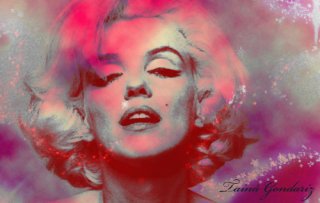
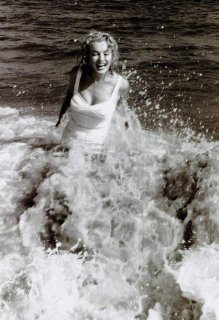
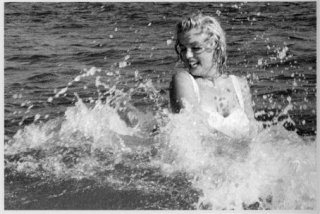
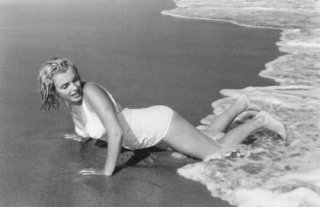
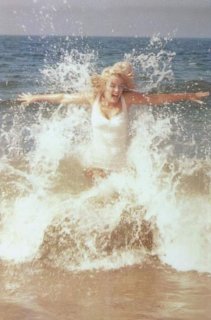
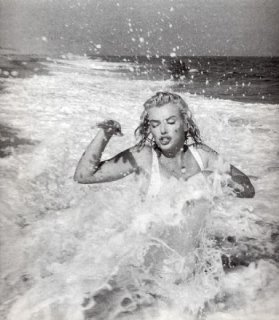
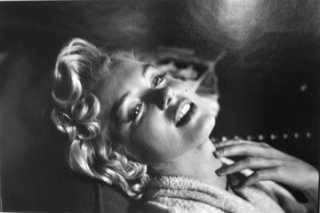
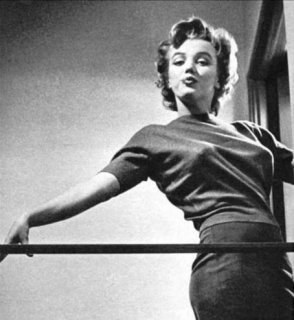
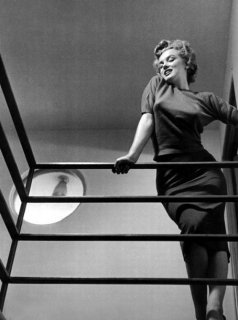
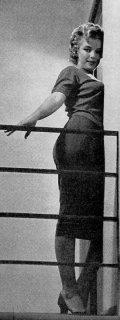
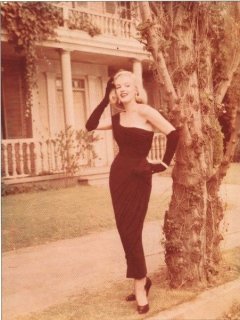
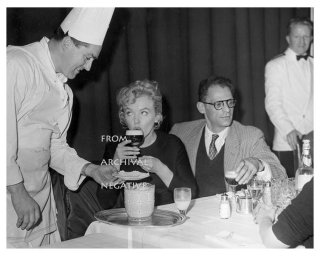
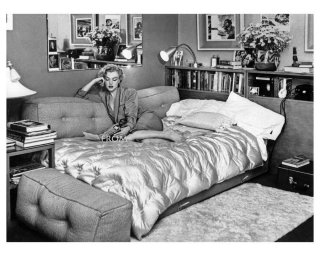
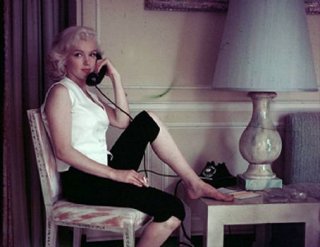
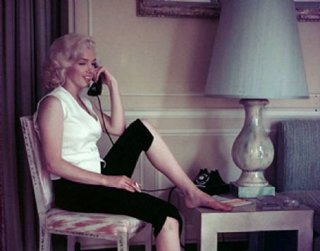
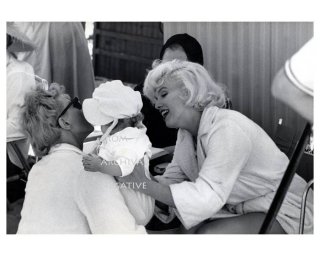
 !
!